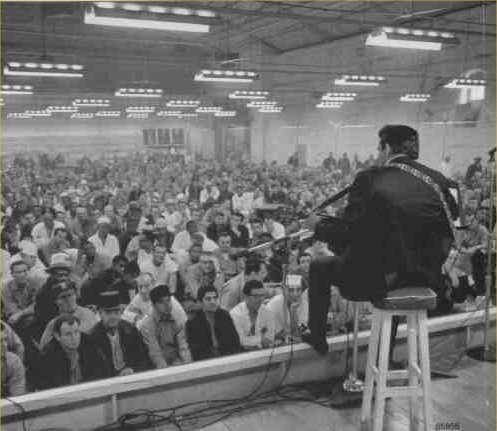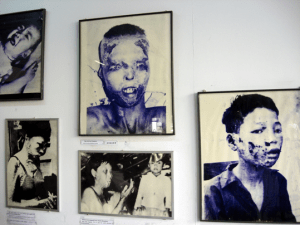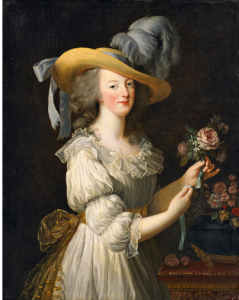“Hello, I’m Johnny Cash.” These famous words once echoed within the walls of a prison that earned its fame through a song. The performance, though, was much more that just a set of lyrics or a nice tune. On January 13, 1968 at the beginning of what would become a tumultuous year, Johnny Cash, June Carter, Carl Perkins and the Tennessee Three performed two shows at Folsom Prison in California. These performances would forever change the landscape of music, reaching Time Magazine’s 100 top albums of all-time in 2006, while also raising awareness for prison reform by putting it into the spotlight.1
Before this performance, Johnny Cash and his health were in a downward spiral. His song “Folsom Prison Blues” was inspired by the film “Inside the Walls of Folsom Prison” in which he saw himself as a prisoner at Folsom. This song caused many of the inmates and people around the United States to believe that he was once incarcerated at Folsom Prison. This was not true, although Mr. Cash had spent a few nights in other jails for drunk and disorderly conduct and possession of drugs. This led many to believe that because of this, Cash’s music and performances resonated with deeply with prisoners.2
The Civil Rights Movement brought attention to prison reform, and Cash’s home state of Arkansas was one of the worst offenders of these kinds of abuses. Their ineffective treatment and rehabilitation of their inmates, along with poor living conditions made him empathize with the men. He decided to use his social and celebrity status he decided to spark a change.His dependence on drugs at the time made Columbia Records unwilling to record a live performance at the prison. But in 1967 both Cash and Columbia Records underwent major changes, and when Bob Johnston was put in charge of Cash’s musical performances, Folsom Prison was a go.3

The performance was set for January 13, 1968, so the band and Cash’s father arrived three days earlier to rehearse the carefully crafted lineup of songs. While at El Rancho Motel in Sacramento, California, the Governor of California Ronald Reagan, who was there for an after-dinner speech, visited the band and offered his words of encouragement.4 The night before the performance, Cash stayed up late rehearsing a song written by inmate Glenn Shirley called “Greystone Chapel,” which was about finding God in the chapel at Folsom Prison. Moved by the lyrics “Inside the walls of prison my body may be/But the Lord has set my soul free.” Mr. Cash vowed to play the song the next day. 5
On the morning of January 13, Mr. Cash met with Los Angeles Times writer Robert Hilburn (who later wrote the biography Johnny Cash: The Life) and photographer Jim Marshall at Folsom Prison where things were tense. A guard had recently been taken hostage, and so the inmates were told not to stand during the show. Armed guards carefully watching the crowd from above, but apart from all the chaos stood a calm man dressed in all black. When he took the stage for his first performance out of two that day, the inmates were told not to cheer until he had introduced himself, and they listened. His first song on the list, Folsom Prison Blues, sent the crowd into an uproar and the entire event was a huge success.6

Four months after the performance, the album At Folsom Prison was released. More importantly was the success that came with it, which allowed Cash to speak more about the reform needed in prisons. “He thought the prison system was broken, it wasn’t fixing anybody,” said Mark Stielper, a friend of Cash’s and the family’s designated historian. “The population was mixed, kids and killers. This was his thing; he was really bothered by that.”7 With no other celebrity making society aware of those issues at the time Mr. Cash brought major spotlight, and as a result he was invited by Senator William E. Brock III (R-Tenn.) in July 1972 to testify before the Senate Judiciary Committee’s subcommittee on national penitentiaries. During the same visit Cash met with President Richard M. Nixon in the Oval Office to further discuss the issue. After these important meetings he continued to perform at other prisons, Mr. Cash also spoke about the issue at concerts and on his TV program, and would also visit inmates at his home in Tennessee to play cards and socialize with them. 8
On top of all the musical success was a nation who did not support the cause of prison form enough, and so no traction was really gained from Cash’s advocacy. The performance though, left a lasting effect on country music and solidified Johnny Cash as someone who stood up for those who are often misunderstood and needed help, mirroring his own personal life in a special way.
“So my intuitive take on the time around Folsom is paradoxical, given what the subject matter was: It was the moment that he came into the light. It’s a paradox, but it’s true. When I think about my dad’s life and I think about that moment, that’s when there’s a kind of force, when he embodied who he really was. And that’s light, no matter how much darkness is in it.”
-Rosanne Cash, daughter of Johnny Cash.9
Video interviews made by Northern Light. | Courtesy of YouTube
- Wikipedia, 2018, s.v. “At Folsom Prison,” https://en.wikipedia.org/wiki/At_Folsom_Prison. ↵
- Allison Stewart, “At Folsom prison, Johnny Cash found his cause,” The Washington Post, May 29, 2018, Accessed September 7, 2018, https://www.washingtonpost.com/national/at-folsom-prison-johnny-cash-found-his-cause/2018/05/28/740124ca-4f03-11e8-84a0-458a1aa9ac0a_story.html?noredirect=on&utm_term=.1974f5815d36. ↵
- Colin Woodward, “The Arkansas prison scandal,” March 22, 2018, https://www.arktimes.com/arkansas/the-arkansas-prison-scandal/Content?oid=15957051. ↵
- The Encyclopedia of World Biography, 2nd ed., vol. 3, 2004, s.v. “Johnny Cash,” 353-355. ↵
- Allison Stewart, “At Folsom prison, Johnny Cash found his cause,” The Washington Post, May 29, 2018, Accessed September 7, 2018. ↵
- Robert Hilburn, Johnny Cash: The Life (New York: Little, Brown, and Company, 2013) 325-327. ↵
- Danny Robins, “Johnny Cash and his prison reform campaign,” BBC World Service, Arkansas, January 23, 2013, https://www.bbc.com/news/magazine-21084323. ↵
- Allison Stewart, “At Folsom prison, Johnny Cash found his cause,” The Washington Post, May 29, 2018, Accessed September 7, 2018. ↵
- Michael Streissguth, Johnny Cash’s ‘At Folsom Prison’: Rosanne Cash Recalls Iconic Live Album, January 12, 2018, https://www.rollingstone.com/music/music-country/johnny-cashs-at-folsom-prison-rosanne-cash-recalls-iconic-live-album-204100/. ↵



67 comments
Cassandra Sanchez
Johnny Cash spoke up for those who may have needed it through his music. His ability to relate to the inmates and how they might be feeling helped make an even bigger difference to everyone who needed it. It is amazing how he set an amazing example for his daughter and the rest of the world by being that voice and inspiration to stand up for what is right. His daughter’s admiration for his accomplishments even through the dark times he experienced is truly inspiring
Alexander Avina
This is a very interesting article about Johnny Cash. He is such an interesting and unusual figure, it seems fitting that he would do something so unique. This was a really interesting article about a subject that I wasn’t too familiar with. I enjoyed hearing about this subject on a deeper level. This article was written on a very intriguing subject. This was written very well and included many important facts that I didn’t know before. The article kept me interested all the way through.
Eloy Cruz
The Ring of Fire is the only Johnny Cash song that I have heard of, but as I was reading this, it allowed me to be a little more open to his music and his story. I think what Johnny Cash did for this jail is an example to follow for all celebrities and a great way to show that regardless of the background, music can be given to all and should be given to all.
Emmanuel Diaz
Johnny Cash was no saint but he did know his way with those of the broken and misunderstood. He dealt with addiction and like many others made bad choices but when it came down to standing up for those who no longer were chosen not to be heard he stuck up for them because they were human too. The prison was a place of disorder and Cash was not fond of the idea of there being no structure. He was very compassionate to those he cared for and to those that were seen as a waste. He faced many hardships growing up but was able to turn change the effect it had on him with his career years. Also, I enjoyed the use of his daughters quote. It’s powerful
Michael Lazcano
Johnny Cash was definitely a man of the people, and his shown time and time again why he is so respected in the music world, even to this day. Cash despite his struggles showed to be a person who cares about the well beings of others, whether it’s prisoners who have committed various crimes, or the soldiers in Vietnam. I wish that his performance at the prison would’ve brought more awareness to the broken system that is called prison, but on the bright side it was well received in terms of sales. I think that if something similar was done today with some big artists there would be something done, or at least more protest for the rights of prisoners and such. Johnny Cash was much more then a music artist, he was an advocate for the basic rights of the self.
Olivia Santiago
Like many other musicians, Johnny Cash was a great man that struggled with him demons. In an era where drugs were an integral part of the music scene, he ultimately fell into the downward spiral. However, putting aside his own struggles, he was an incredible person that had a strong sense of empathy and compassion. I like that this article reveals this aspect of Cash’s life and career as he is often labeled by his addiction.
Emily Velazquez
I loved that final quote form Johnny Cash’s daughter. It was definitely a great way to end the story with. Johnny Cash was and still is a widely known American singer and songwriter. I love listening to his songs and watching movies made on him. I never knew about how active he was in raising awareness for those inmates who were receiving bad treatment and poor living conditions. If anything, after reading this article, I feel as if I owe more respect to the man.
Paola Arellano
This is a celebrity that I am not too familiar with however, I enjoyed reading this article. I cannot believe that someone actually made a point to focus on the prisoners of a jail being that he was full of fame and fortune. Usually celebrities do not take much thought especially to jails and for that I admire him. Considering the fact that this was a major issue circulating in society, I am sure that it facilitated how he expressed himself. I would have been extremely scared to perform in front of them especially after the guard was taken. However, I think that this story says a lot about his character and I am glad that it brought awareness to such an important issue.
Danniella Villarreal
I really appreciate an artist who makes music for a purpose and for a change. He always put such passionate meaning and depth into his songs. I found it interesting that he played right in front of the prisoners and how there is not really anything between him and the prisoners, he is just on a normal stage, as shown in the picture. This was a very interesting article to read, I don’t listen to his music but I know who he is.
Rosario Moreno
I personally love Johnny Cash and his music, and reading this article has brought back so many listening to his music. I really appreciate artist who make music for a purpose and for a change. Johnny Cash did not only put on a great performance for all of the inmates at the Folsom prison, but also brought awareness for a prison reform. Great article on a historic figure in music!